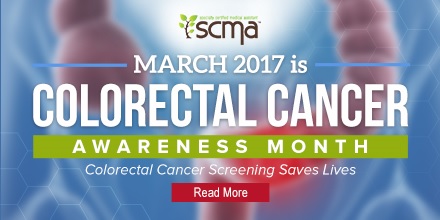March Is Colorectal Cancer Awareness Month
By SCMA On 28/02/2017


March 2017 is Colorectal Cancer Awareness Month, and we at Specialty Certified Medical Assistant – SCMA® have put together this page to recap what you can do to prevent Colorectal Cancer.
The colon and rectum are part of the large intestine. Colorectal cancer is a disease in which malignant (cancer) cells form in the tissues of the colon or the rectum. Different factors increase or decrease the risk of getting colorectal cancer. It is common in both men and women and, according to the U.S. Centers for Disease Control and Prevention, or CDC, is the second leading cause of U.S. cancer-related deaths.
Nearly 52,000 Americans died from colorectal cancer in 2013. It affects people in all racial and ethnic groups and is most often found in people age 50 and older. However, you're even more likely to get it if you have colorectal polyps, a family history of colorectal cancer, ulcerative colitis or Crohn's disease, eat a diet high in fat, or smoke.

Consider these statistics from the SEER Cancer Statistics Review:
- Colon and rectum cancer represents 8.0% of all new cancer cases in the U.S.
- It is the fourth most common cancer diagnosed in the United States
- Colon and rectum cancer is most frequently diagnosed among people aged 65-74.
- The percent of colon and rectum cancer deaths is highest among people aged 75-84.
- Number of New Cases and Deaths per 100,000: The number of new cases of colon and rectum cancer was 41.0 per 100,000 men and women per year. The number of deaths was 15.1 per 100,000 men and women per year. These rates are age-adjusted and based on 2009-2013 cases and deaths.
- Lifetime Risk of Developing Cancer: Approximately 4.4 percent of men and women will be diagnosed with colon and rectum cancer at some point during their lifetime, based on 2011-2013 data.
- Prevalence of This Cancer: In 2013, there were an estimated 1,177,556 people living with colon and rectum cancer in the United States.
Colorectal Cancer Screening Saves Lives
Screening is looking for cancer before a person has any symptoms. This can help find cancer at an early stage. When abnormal tissue or cancer is found early, it may be easier to treat. By the time symptoms appear, cancer may have begun to spread.
Scientists are trying to better understand which people are more likely to get certain types of cancer. They also study the things we do and the things around us to see if they cause cancer. This information helps doctors recommend who should be screened for cancer, which screening tests should be used, and how often the tests should be done.
Key Points
- Tests are used to screen for different types of cancer.
- Studies show that some screening tests for colorectal cancer help find cancer at an early stage and may decrease the number of deaths from the disease.
- Five types of tests are used to screen for colorectal cancer:
When Should Screening Begin?
Screening for colorectal cancer should begin soon after turning 50 and continue at regular intervals. However, others may need to be tested earlier than 50, or more often than other people, if—
- You or a close relative have had colorectal polyps or colorectal cancer.
- You have an inflammatory bowel disease such as Crohn's disease or ulcerative colitis.
- You have a genetic syndrome such as familial adenomatous polyposis (FAP) or hereditary non polyposis colorectal cancer (Lynch syndrome).
More importantly, the patient should speak with their doctor about when they should begin screening and how often they should be tested.
It is important to remind the patient that doctors do not necessarily think they have cancer if he or she suggests a screening test. Screening tests are given when you have no cancer symptoms and may be repeated on a regular basis.
If a screening test result is abnormal, you may need to have more tests done to find out if you have cancer. These are called diagnostic tests.
Screening can find precancerous polyps—abnormal growths in the colon or rectum—so that they can be removed before turning into cancer. Screening also helps find colorectal cancer at an early stage, when treatment often leads to a cure. About nine out of every 10 people whose colorectal cancers are found early and treated appropriately are still alive five years later.
References & More Information:
Colorectal Cancer
Prevent Cancer Foundation, Colorectal Cancer Awareness Month Sponsor
Your Medicare Coverage: Colorectal Cancer Screenings
Center for Medicare & Medicaid Services
Basic Information About Colorectal Cancer
Centers for Disease Control and Prevention
Colorectal Cancer Screening Saves Lives [PDF – 2 MB]
Centers for Disease Control and Prevention
Colorectal Cancer Control Program
Centers for Disease Control and Prevention
Get Your Colorectal Cancer Screening Today [PDF – 1 MB] External Links Disclaimer Logo
Asian & Pacific Islander American Health Forum
Cancer and African Americans
Department of Health and Human Services, Office of Minority Health
Tests to Detect Colorectal Cancer and Polyps: Fact Sheet
National Institutes of Health, National Cancer Institute
What I Need to Know About Colon Polyps
National Institutes of Health, National Institute of Diabetes and Digestive and Kidney Diseases, National Digestive Diseases Information Clearinghouse
 844.885.1476
844.885.1476
